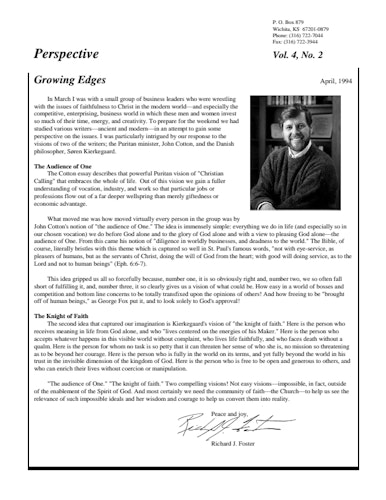Introductory Note:
In March (1994), I was with a small group of business leaders who were wrestling with the issues of faithfulness to Christ in the modern world—and especially the competitive, enterprising, business world in which these men and women invest so much of their time, energy, and creativity. To prepare for the weekend we had studied various writers—ancient and modern—in an attempt to gain some perspective on the issues. I was particularly intrigued by our response to the visions of two of the writers; the Puritan minister, John Cotton, and the Danish philosopher, Søren Kierkegaard.
Richard J. Foster
Renovaré Founder
In March (1994) I was with a small group of business leaders who were wrestling with the issues of faithfulness to Christ in the modern world — and especially the competitive, enterprising, business world in which these men and women invest so much of their time, energy, and creativity. To prepare for the weekend we had studied various writers — ancient and modern — in an attempt to gain some perspective on the issues. I was particularly intrigued by our response to the visions of two of the writers; the Puritan minister, John Cotton, and the Danish philosopher, Søren Kierkegaard.
The Audience of One
The Cotton essay describes that powerful Puritan vision of “Christian Calling” that embraces the whole of life. Out of this vision we gain a fuller understanding of vocation, industry, and work so that particular jobs or professions flow out of a far deeper wellspring than merely giftedness or economic advantage.
What moved me was how moved virtually every person in the group was by John Cotton’s notion of “the audience of One.” The idea is immensely simple: everything we do in life (and especially so in our chosen vocation) we do before God alone and to the glory of God alone and with a view to pleasing God alone — the audience of One. From this came his notion of “diligence in worldly businesses, and deadness to the world.” The Bible, of course, literally bristles with this theme which is captured so well in St. Paul’s famous words, “not with eye-service, as pleasers of humans, but as the servants of Christ, doing the will of God from the heart; with good will doing service, as to the Lord and not to human beings” (Eph. 6:6 – 7).
This idea gripped us all so forcefully because, number one, it is so obviously right and, number two, we so often fall short of fulfilling it, and, number three, it so clearly gives us a vision of what could be. How easy in a world of bosses and competition and bottom line concerns to be totally transfixed upon the opinions of others! And how freeing to be “brought off of human beings,” as George Fox put it, and to look solely to God’s approval!
The Knight of Faith
The second idea that captured our imagination is Kierkegaard’s vision of “the knight of faith.” Here is the person who receives meaning in life from God alone, and who “lives centered on the energies of his Maker.” Here is the person who accepts whatever happens in this visible world without complaint, who lives life faithfully, and who faces death without a qualm. Here is the person for whom no task is so petty that it can threaten her sense of who she is, no mission so threatening as to be beyond her courage. Here is the person who is fully in the world on its terms, and yet fully beyond the world in his trust in the invisible dimension of the kingdom of God. Here is the person who is free to be open and generous to others, and who can enrich their lives without coercion or manipulation.
“The audience of One.” “The knight of faith.” Two compelling visions! Not easy visions — impossible, in fact, outside of the enablement of the Spirit of God. And most certainly we need the community of faith — the Church — to help us see the relevance of such impossible ideals and her wisdom and courage to help us convert them into reality.
Peace and joy,
Richard J. Foster
Text First Published April 1994



